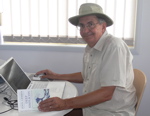
Journals 2007
Notes
Literature
Mathematics
Technology
Birding
ModelTrains
Philosophy
Psychology
Science
History
Time
YTDate
January
February
March
April
May
June
July
August
September

Journals 2007
Notes
Literature
Mathematics
Technology
Birding
ModelTrains
Philosophy
Psychology
Science
History
Time
YTDate
January
February
March
April
May
June
July
August
September
I do not have Internet access at the moment.

Yesterday we toured the Bangalow markets. They were fantastic, and a bit more enjoyable than in the heat of the summer. We bought fresh passion fruit, tomatos, bananas as well as a book on Virginia Woolf, a very nice carrying bag and a superb bowl and coffee mug from a local potter. The crowd began to pick up by noon and soon both the market and the approaching roads were jammed.
I am enjoying my first cuppa of the morning with the new coffee mug. I love the color and it fits just right in my hand.

We borrowed an external modem for our laptop and tried installing the software to use dial-up internet access but were unsuccessful in getting it working. The instructions were for an earlier version of OS X and occasionally I found myself guessing as to what to do next. In the process I deleted a file called Internet Connect that gave me some additional performance information on the connection. I will try taking my computer to Allan and see if we can figure out how to make it work. Overall, a bit frustrating and certainly disappointing.
However the main task today will be to drive to Lismore and retrieve our barbeque from storage and get it assembled. We also hope to borrow a patio table that we can use as our computer desk.
| Immediate | Description | Time |
|---|---|---|
| Mathematics | "Why Beauty is Truth: A History of Symmetry" by Ian Stewart | 1 hr |
| Technology | Work on trying to get an internet connection working | 2 hr |
| Literature | "Three Dollars" by Elliot Perlman | 1 hr |
I read the second chapter of "Why Beauty is Truth" by Ian Stewart yesterday evening. I need to have a closer look at it this morning while making a few notes. Last night I had difficulty seeing the relevance of the chapter to the topic of the book as it didn't seem to discuss either equations or symmetry.
2. The Household Name